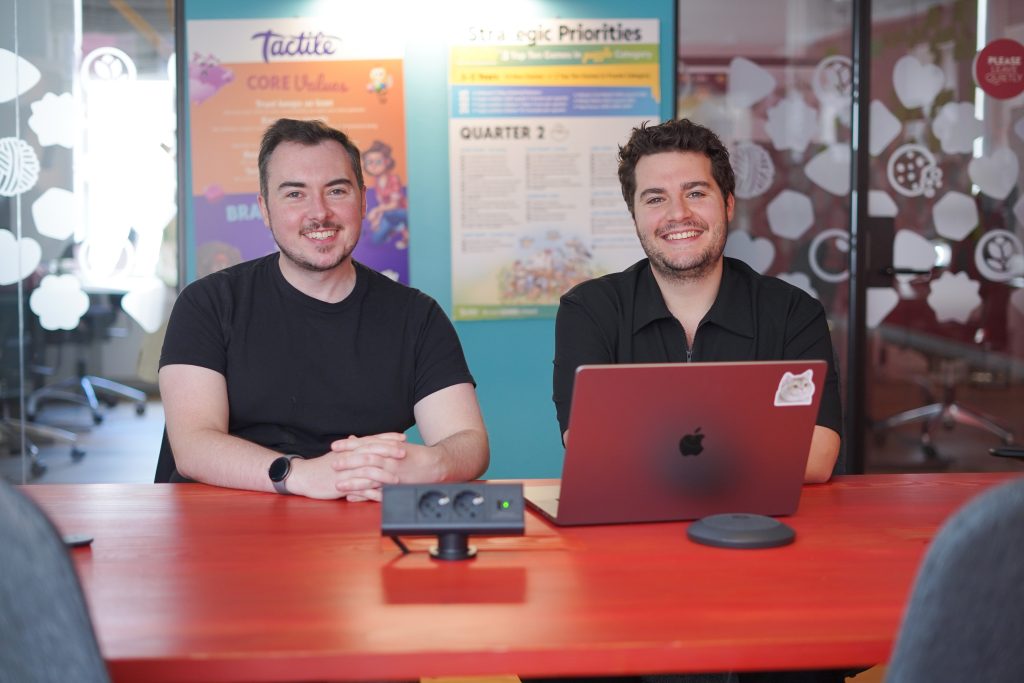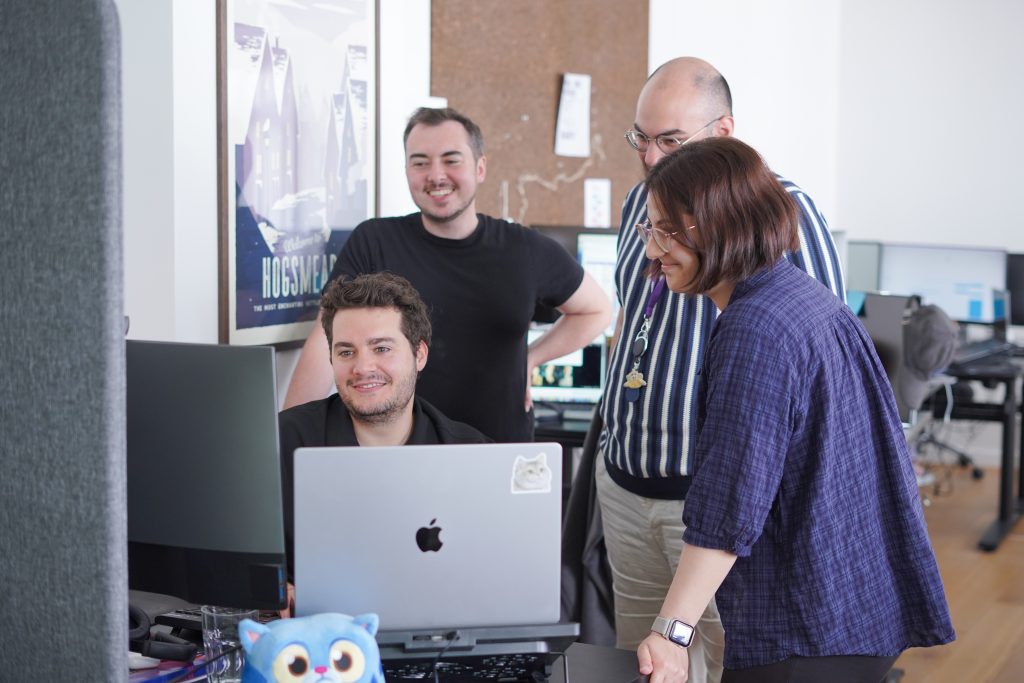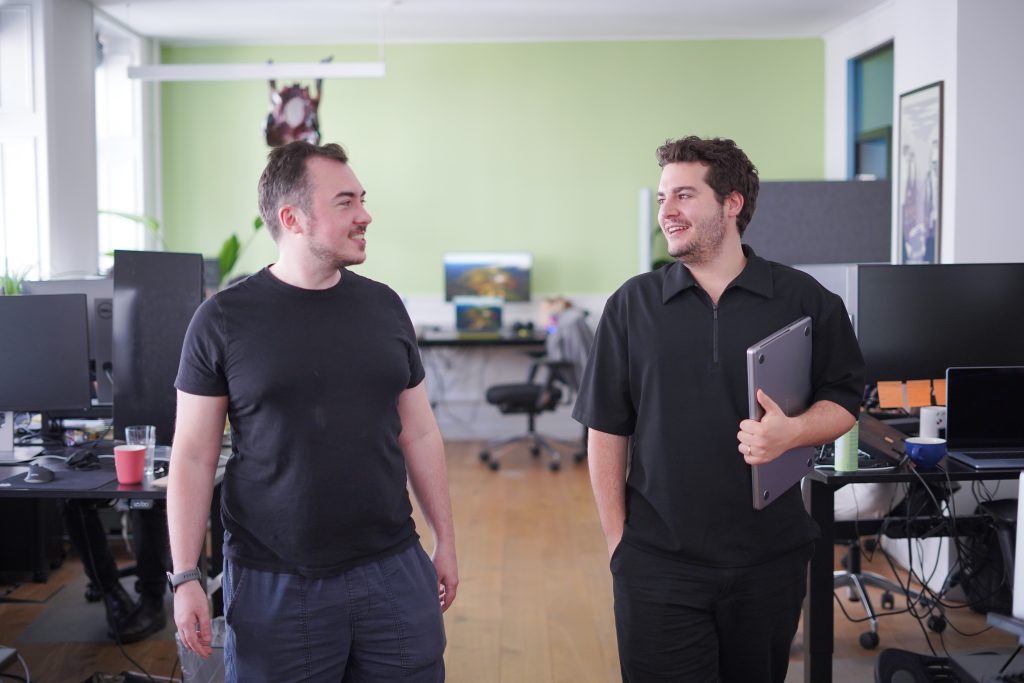It’s Time for Talent – with Asker Markussen
Hi, my name is Asker, it’s nice to e-meet you! 👋
I initially joined Tactile in 2021 as a 3D Character Animator in the Creative Marketing department. A couple of years later, I got the opportunity to move to game production, where I now work as the Lead Animator on one of our newest games. In my role, I oversee all animation and work closely with the art team to create a fun experience for our players.
🚀 Before Tactile
I was always glued to the screen as a kid. Playing video games and watching every animated show I could find, so it was always my dream to work in games and movie production.
After high school, I knew I needed to grow not just as an animator, but also as a person. I enrolled in an online animation school at Animation Mentor and started a university program in software development at ITU at the same time. It was a lot of work, to say the least, but I learned so much.
After finishing the online animation course, I was offered a job at Tactile Games. Without much hesitation, I took a big risk and dropped out of university to work at Tactile full-time as a character animator.
💜 Joining Tactile
When I joined, I was totally green when it came to working full time in a professional environment and working as a 3D animator, so there was plenty of growing to do! Luckily, the whole team in Creative Marketing made sure to take good care of me. People are extremely supportive here. Feedback and daily communication is essential to the development of the employees and the work we do at Tactile.
Joining tactile had a great impact on my growth as an animator. This was the first time I had been surrounded by like minded people who were all interested in creating art and animation and were all motivated to learn and grow their craft.
💪 Having an impact
I am currently on a team working on one of our new games. I spend most of my time animating in Maya, giving feedback and implementing art and assets in Unity. It is a great mix between artistic and technical skills that I find very fun and there is always more to learn.
My favorite part of working with a new, smaller team is that experimentation and fast iteration is possible. It is so much fun to see great ideas have an impact on the final product and that everyone can work together and collaborate on a specific vision.
It is also very rewarding to see your hard work become part of a bigger product and how a lot of work and polish can take a game from good to great.
📚 The keys to success
If you are looking to get into animation in the gaming industry here’s some tips from my experience:
- Master the basics. In gaming, animations are often short and precise and each animation will be seen dozens or even thousands of times by each player, so every movement matters.
- I think now more than ever it is important to be open minded and curious about new tools and work flows, and embrace disciplines outside of your comfort zone.
- AI is one of the biggest shifts we’ve seen and while it comes with plenty of unknowns, it also opens up exciting new possibilities for animators and artists alike.
Thanks for sharing, Asker! 💜
It’s Time for Growth – with Vera Kozlenko
At Tactile, we encourage our team members to take ownership of their own development and drive their upskilling to match the needs of the company, as well as their own aspirations.
The desire to upskill oneself is crucial for the success of our business, so having team members with that mindset is what we believe is part of pushing us forward.
We chatted to our UI Game Artist, Vera Kozlenko, to learn more about how she grew into the most passionate AI Artist within the company 👏
Read more about how she upskills by blending UI and AI below 🚀

Tactile: Hi Vera, can you tell us a little bit about what your role was when you started at Tactile?
Vera: I initially applied for a 2D Artist position but was instead offered the role of a UI Artist.
In this capacity, I joined Lily’s Garden Product team, where I worked on creating new in-game features and other UI-related elements, contributing directly to the game’s user experience and visual polish.
Tactile: How have you grown and developed in your role since then?
Vera: Although my background was originally focused on illustration and 3D art, working on Lily’s Garden sparked my interest in expanding my technical expertise.
I closed all knowledge gaps on my own and significantly improved my Unity and animation skills. Over time, I moved to creating animations directly in Unity, and in recent months, I’ve grown passionate about experimenting with shaders to create visual effects.
Tactile: So how did you end up diving deeper and deeper into the world of AI?
Vera: I have a Master’s in Mathematics and Applied Computer Science, so I’ve always been drawn to both the visual and technical sides of art. Working as a UI Artist gave me the ideal opportunity to combine my strong technical foundation with a creative role, especially now with the rise of AI tools. I explored how other artists use AI in their workflows and was inspired by the quality and originality of their results.
The ComfyUI interface didn’t intimidate me, so I was very curious, motivated and felt a strong drive to innovate. And so I began setting aside 1–2 days each sprint to learn and experiment with new AI models. This self-driven exploration helped me bring technical innovation into our production pipeline and evolve my creative process.
It works great for concept art.
Tactile: How has your day-to-day changed since you incorporated more AI into your workflows?
Vera: I continue to work as a UI Artist, but AI has become a core part of my daily workflow. I use our in-house plugin for prototyping, sketching, and polishing assets. I can now create any asset using AI alone, or combine it with 3D or 2D, depending on the needs of the project. I really enjoy working with image-to-image workflows – taking a sketch or a 3D model and turning it into a polished, visually appealing result.
For one task, I generated a depth map from my 3D model and used a ControlNet-based workflow to let AI handle the color pass. It helped me to quickly explore and find color combinations I really liked.
I tested it for fun, but in the end, I just finished the chests by hand.
My daily routine has also evolved: I help to maintain our internal AI tools, monitor the status of our AI machines and our custom Tactile Photoshop plugin, and make sure everything runs smoothly. I assist artists when something breaks or gets stuck, run short training sessions, and support anyone interested in using AI in their creative workflow.
Tactile: Do you have any tips for artists learning about how they can use AI in their work? Where is a good place to start?
Vera: If you’re just starting to explore AI in art, my advice is: watch how other artists work. See what models they use, how they build their pipelines, and what kind of results they get. Take a moment to reflect on what exactly you admire in their results, and try to understand what personally resonates with you in those interests. For example, I never used to enjoy creating characters, but now the idea of designing one doesn’t feel intimidating anymore.
When it comes to more technical topics, my advice is this: try building your own workflows with Stable Diffusion or Flux using ComfyUI. Start with something simple like text-to-image, then move on to image-to-image, learn masks, and so on. That’s the foundation. After that, you can explore custom styles and more advanced setups.
Don’t expect perfect results right away – that’s totally normal. It takes time to understand how to get the look you want. And most importantly, remember: AI is just another tool. It won’t replace your creativity, but it can help you work faster, try new things, and bring your ideas to life in new ways.
Tactile: What do your development plans look like for the future?
Vera: I’m excited to explore new AI models for 3D and video generation. It’s a direction I want to spend more time on in the coming months. I’m especially interested in models that can run locally in ComfyUI. For now, I’m focused on testing the latest updates to the model we use, since staying up to date is essential when things are moving this fast.
Thank you for the lovely chat, Vera 💜
In 2023, 3 years after the launch of Simon’s Cat: Story Time on Apple Arcade, we felt like it was time to start thinking about the next game. This time, we really wanted to push the boundaries of what we’ve done before and explore more options with this IP. Our UK team, who has been working in close collaboration with the Simon’s Cat team since 2017, started brainstorming new ideas. They looked at the market to understand what were the general trends and which games were doing well. At the same time, Simon sent some of his own concepts in, which helped set the framework for what would later become Simon’s Cat Match.
As a company, since the launch of Lily’s Garden in early 2019, we have been focusing predominantly on developing story-driven, landscape games. Exploring within the realm of Simon’s Cat IP, having previously developed blast, swap and pop games, has given us the opportunity to see whether we can develop a competitive game in the current match-3 market. Beyond that, it has enabled us to get back to our roots – the portrait mode style games with a light meta layer and a big focus on gameplay. This has also given us the opportunity to reach a wider player audience, as the match-3 genre has a more universal appeal.
To fully understand how we tackled the challenge of building a more gameplay focused match-3 game with the help of Simon’s Cat IP, we sat down with Luke, our UK studio’s Producer, and Ali, Simon’s Cat Match Product Lead.

Reigniting the spark
Bringing Simon’s Cat Match to life was truly a cross-studio collaboration. At the beginning, the UK team (based in Derby) kick-started the project and created the first version of the game. After running some technical tests, the results showed promising metrics. At the same time, after wrapping up their latest project, there was a team in Copenhagen ready for the next adventure. It was the perfect match! 😄🧩
The collaboration between the 2 studios started by working on improving version 1 of the game and prepping it for another technical test. Whilst the Derby team brought the knowledge of the IP to the table, the Copenhagen team brought the expertise and learnings from our older games, such as Lily’s Garden and Makeover Match.
Makeover Match (MM), in fact, served as the basis for this new Simon’s Cat game. When we started working on MM, we invested a significant amount of time into re-developing our core gameboard tech. The new tech enables us to do a lot more with our game board, including expanding our core gameplay mechanics. This is why we were able to take MM, flip it from landscape to portrait, and start building Simon’s Cat Match on top of it.
Making the game pawesome
The initial vision for the game hasn’t changed drastically throughout the development. Match-3 levels remained the main focus of the game, but over time, the game started to develop its own identity. As this is a young game, the team was able to move faster and make bolder changes.
When the game was in soft launch, they continued researching the market with the aim of improving the initial metrics. They found that there were games with ‘find the thing’ that were performing really well, but they were mainly in black and white. Since our in-game areas were in full colour, we decided to add the colouring aspect. This felt like a great match with the Simon’s Cat IP, both from the general artistic perspective, but also because it added the +1 innovation aspect to the game that would differentiate us from competitors. On top of that, ‘find the thing’ and colouring creatives were yielding great results in marketing.
And so it felt like the most natural decision to change the meta of the game and implement these two mechanics. The colouring part in particular fits well with the original Simon’s Cat YouTube series which were in black and white. “It feels like bringing Simon’s sketches to life,” says Luke Earle, the game’s Producer. “This has made Simon’s Cat Match the most on-IP game we have ever released.”
Once we had settled on the core gameplay and meta aspects of the game, it was time to dive into the nitty gritty details. From the start, the team incorporated special level types into the game, but they wanted to add even more diversity. They once again took a look at the general match-3 market, as well as what other in-house productions were working on.
Finally, after extensive testing and research, the team decided to add Garden Battle levels to the game. The general idea behind this special level type is that the player is playing against a villain in the game – this villain then calls his minions to the gameboard, which makes it more challenging for the player to complete the level. It’s not just about reaching the level goal with a limited amount of moves, but also about doing so before the villain has a chance to counter attack. Adding the Garden Battle levels has given the team a lot of freedom to try out new things, such as implement new game board pieces (which is important for user experience and engagement) and connect the game better with the narrative of the IP (in Simon’s Cat YouTube series storyline, there is a big rivalry between Cat and Jazz, who is also our in-game villain).
The benefits of having a strong track record
“Having worked on 3 Simon’s Cat games previously, we have spent a significant amount of time on polishing them, so there has been a huge evolution of our art and animation skills over time. This is now reflected in the visual quality of Simon’s Cat Match and is something we’re extremely proud of,” says Luke.
A lot of the know-how came from our work on Lily’s Garden. In the game’s meta layer, the art team has to create 3 versions of each prop, which the player can then choose from when making renovations. This means that over the years, the team really optimized the asset creation process. This allowed Simon’s Cat team to take and apply the knowledge to their own project.
On top of that, the UK team’s close collaboration with Simon and his team, as well as the connection with the team in Copenhagen and other studios working on the art assets, allowed for the creation of a really strong feedback process. “Discussing ideas quickly and brainstorming without having to go through extra layers of management has allowed us to make improvements faster. This is why the visual part became the strongest aspect of the game,” says Ali, Simon’s Cat Match Product lead. “Having a flatter structure within teams allows for everyone to share their opinions, regardless of their background, experience or seniority.”

Besides nurturing our flat structure, what’s helped us improve over the years has been growing our teams with skilled new Tactilers. This includes also expanding our leadership team with the addition of Norberto (Chief of Data & Analytics) and Jacob (CMO), who brought with them strong knowledge from the casual mobile gaming industry. These skilled people have helped us to elevate the quality of our products and have made a significant difference to our ways of working. A great example of such an addition to our team is Ali himself, who has brought with him the experience and knowledge from the Turkish gaming industry. These new talents, combined with the knowledge accumulated over many years by the more ‘seasoned’ Tactilers, has allowed us to reflect, learn, reuse and innovate better than ever before.
“There’s always the danger of everyone starting to think in a similar way when the same team spends a long time together,” explains Ali. “So getting people from other projects or even other studios is really helpful, as it allows for fresh perspectives.”
ONE team
Simon’s Cat Match was launched worldwide on March 26th 2025 🥳
Since then, the teams (in UK, Copenhagen, Argentina & Tenerife) continue to collaborate closely and continuously work on improving the connection between them. It is extremely important that no team works in a complete silo.
When asked about how they ensure strong links between teams, Luke explains: “As the Producer, it is key for me to plan our time well so that everyone can meet on a regular basis and hold conversations together. This is important in order for everyone to feel like a true part of the team, to understand our ways of working, the long-term vision, short-term goals, and is looped into all decision making processes.” This applies to art, game and level design, programming, QA, analytics and product – everyone is working together to achieve the desired goals.
Beyond this, open conversations and ad-hoc meetings are always encouraged. As the team is sitting across different locations, it’s important that team members are available on Slack or to jump on a quick call, to allow for the water-cooler conversations to translate into the digital space. Despite being in different locations, Simon’s Cat Match team is ONE team. “Everyone wants the project to succeed and so we never stop looking for ways to improve the product and the ways we work together,” adds Ali.

Ultimately it’s all about having the right people on the right project at the right time. Staying flexible within our roles allows us to allocate the right resources to new game projects. On top of that, everyone at Tactile is approachable and open to share knowledge from their own experiences, even if they’re not directly involved in a project. It’s all about being passionate about what we do.
“Everyone on the team loves playing match-3 games, which is crucial for me. It is extremely helpful as it creates a wider understanding of the market. When we discuss any aspect of the game, it’s important that people have informed opinions,” says Ali. When people love to play games and have plenty of experience in doing so, it enables the team to identify critical bugs in the game’s logic. It also allows us to go beyond just being game developers and to also apply the user experience perspective.
Luke wraps things up perfectly: “People are passionate about games. We are passionate about making games and we want to make the best games out there. That’s what we’re striving for and working towards. We want to play in the same field as the biggest game companies out there, but show them that success can also be achieved with smaller teams. And we want to be at the forefront of doing that.”
Simon’s Cat Match is just the first step. Stay tuned for more … Ahoy!
